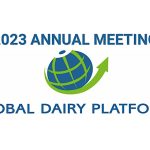As the United Nations Framework Convention for Climate Change Conference of Parties (COP28) in the United Arab Emirates reached its closure on 12 December, the International Dairy Federation (IDF) and Global Dairy Platform (GDP) wish to share their conclusions.
In order to tackle climate change in times of rapid population growth without compromising global nutrition security, it is necessary to maintain a balanced strategy encompassing nutrition, economic and social sustainability, and climate action within agrifood systems.
Reducing greenhouse gas (GHG) emissions is part of the priorities for the global dairy sector while also ensuring that the nutritional and societal benefits that dairy sector brings continue. We are focused on actions that will have the biggest impact and foster collaboration across the sector and along the value chain.
All climate action strategies should acknowledge the importance of terrestrial animal source foods, including dairy products, for healthy nutritious diets at all ages, but especially during childhood, adolescence and old age. This is particularly important in developing countries, where efforts to combat hunger and achieve SDG2 should include dairy foods, due to their irreplaceable role in providing essential nutrients, such as high-quality proteins, calcium, magnesium, selenium, riboflavin, and vitamins B5 and B12.
It is important to recognize the proactive efforts of dairy farmers and producers in implementing sustainable and climate-friendly agricultural solutions. The Pathways to Dairy Net Zero initiative is supported by over 200 organisations including companies, industry organisations, governments, and academic institutions. Moreover, the global dairy sector will continue to incorporate increasingly innovative methods to ensure sustainable production aligning with climate action objectives.
While the global dairy sector is delivering on its commitments to reduce GHG emissions, we cannot do it on our own. We need a political and regulatory framework that incentivises farmers and the dairy sector to accelerate the transition. Specifically, we need policies that remove barriers to developing and deploying on-farm solutions to GHG emissions by funding more research, streamlining and speeding up approvals of new technologies and solutions, and financing on-farm adoption of tools for meaningful emissions reductions.
IDF and GDP advocate for collaboration between actors from the sector and key stakeholders, supported by informed policy decisions, to navigate the complexities and achieve harmony between nutritional needs, sustainability, and climate action in agrifood systems.
Please, watch the following official side events from COP28:
- IDF and European Dairy Association:
How animal source foods nourish the world in times of climate change
- GDP, Global Roundtable for Sustainable Beef, Canadian Cattle Association, and Beef + Lamb New Zealand:
Farmer-led Adaptation and Mitigation Measures through Improved Global Livestock Sustainability




